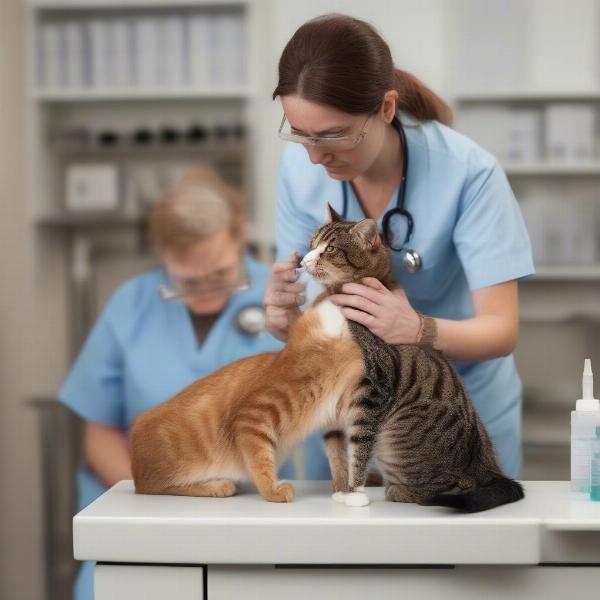Veterinary care is crucial for both dogs and cats, ensuring their health and well-being throughout their lives. Understanding the basics of veterinaria dog cat care, from routine checkups to emergency situations, is essential for responsible pet ownership. This article provides a comprehensive overview of veterinary needs for both canine and feline companions, helping you navigate their healthcare journey.
Regular Checkups: The Cornerstone of Veterinaria Dog Cat Care
Preventative care is the best way to keep your furry friend healthy. Regular veterinary checkups allow for early detection of potential health issues, vaccinations against common diseases, and personalized advice on nutrition, behavior, and overall wellness.
What to Expect During a Veterinaria Dog Cat Checkup
During a standard checkup, your veterinarian will perform a thorough physical examination, assessing your pet’s weight, body condition, eyes, ears, teeth, and coat. They’ll also discuss your pet’s lifestyle, diet, and any concerns you may have. dog crate for lab This is a great opportunity to ask questions and get professional guidance on your pet’s health.
Vaccinations: Protecting Your Pets from Preventable Diseases
Vaccinations are a cornerstone of preventative veterinaria dog cat care. They protect against a range of serious and sometimes fatal diseases. Your veterinarian will tailor a vaccination schedule based on your pet’s age, lifestyle, and risk factors.  Vaccinating Dogs and Cats
Vaccinating Dogs and Cats
Core and Non-Core Vaccinations for Dogs and Cats
Core vaccines are essential for all dogs and cats, protecting against diseases like rabies, distemper, and parvovirus. Non-core vaccines are recommended based on specific risk factors, such as exposure to other animals or certain environments.
Common Health Issues in Dogs and Cats
Understanding common health issues in dogs and cats is important for early recognition and prompt veterinary intervention. weighted dog Some common concerns include skin allergies, ear infections, dental problems, and parasites.
Recognizing the Signs of Illness in Your Pet
Being attuned to your pet’s behavior and physical condition can help you identify potential health issues early on. Changes in appetite, energy levels, bathroom habits, or behavior can all be indicators of an underlying problem.
Emergency Veterinary Care: When to Seek Immediate Help
Knowing when to seek emergency veterinary care can be life-saving for your pet. Signs of a veterinary emergency include difficulty breathing, severe vomiting or diarrhea, seizures, trauma, and sudden collapse. dog eats styrofoam If you suspect your pet is experiencing a medical emergency, contact your veterinarian or the nearest emergency animal hospital immediately.
Choosing the Right Veterinarian for Your Dog or Cat
Finding a veterinarian you trust is an important part of responsible pet ownership. Consider factors such as location, experience, specialization, and communication style when choosing a veterinarian for your dog or cat. dog bed for hip dysplasia Recommendations from friends, family, or local animal shelters can be helpful in your search.
Conclusion
Veterinaria dog cat care is essential for the well-being of our beloved companions. From routine checkups and vaccinations to emergency care, understanding your pet’s veterinary needs is crucial for responsible pet ownership. By being proactive and informed, you can help ensure your furry friend lives a long, healthy, and happy life.
FAQ
- How often should I take my dog/cat for a checkup? Annual checkups are generally recommended for healthy adult pets, while senior pets may require more frequent visits.
- What are the signs of a dental problem in my pet? Bad breath, red or swollen gums, difficulty chewing, and excessive drooling can indicate dental issues.
- When should I seek emergency veterinary care? Seek immediate veterinary attention for difficulty breathing, severe vomiting or diarrhea, seizures, trauma, and sudden collapse.
- How do I choose the right veterinarian for my pet? Consider factors such as location, experience, specialization, and communication style when choosing a veterinarian.
- What are the core vaccines for dogs and cats? Core vaccines protect against diseases like rabies, distemper, and parvovirus in dogs, and panleukopenia, calicivirus, and rhinotracheitis in cats.
- How can I prevent parasites in my pet? Regular use of preventative medications, as prescribed by your veterinarian, is the most effective way to prevent parasites.
- What are some common signs of illness in pets? Changes in appetite, energy levels, bathroom habits, or behavior can all be indicators of an underlying problem.
Quote from Dr. Emily Carter, DVM: “Preventative care is the best investment you can make in your pet’s health. Regular checkups and vaccinations can help prevent serious illnesses and ensure your furry friend lives a long and happy life.”
Quote from Dr. Michael Davis, DVM: “Knowing your pet’s baseline behavior and physical condition is key to recognizing potential health problems early on. Don’t hesitate to contact your veterinarian if you notice any changes or have any concerns.”
ILM Dog is a leading international pet website dedicated to providing expert advice and resources for dog owners worldwide. We offer comprehensive information on dog breeds, health and medical care, training and behavior, nutrition, grooming, and much more. canaural ear drops for dogs For personalized guidance and support on your dog ownership journey, connect with us at [email protected] or call us at +44 20-3965-8624. ILM Dog is your trusted source for all things dog-related.